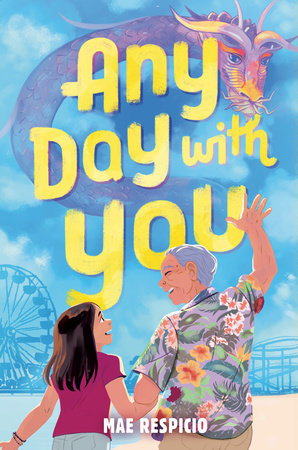Fresh Voices: Mae Respicio
Welcome to Fresh Voices! In this new series, we are excited to share with you authors whose books capture a unique aspect of the human experience. Enjoy this Q&A with Mae Respicio, author of Any Day with You!
Since May is Asian American Heritage month, could you speak about what this means to you?
Growing up, I danced in a Filipino folk dance troupe (lending some inspiration to The House That Lou Built!) and we performed at festivals for Asian American Heritage Week (later “month”)—so it has special significance for me. I feel fortunate to have parents who’ve always tried to instill the value of my culture and of knowing where my family came from, and I think that’s a large drive behind why I write what I do. And while Asian American Heritage Month is every day for me, it’s meaningful to have an official time to spark thoughtful questions and conversations—especially with young readers.
What inspired you to write Any Day with You?
I wanted to celebrate a lot of things in this book—family, friendship, creativity—but my main gem of inspiration came from wanting to explore how our family’s stories take root, and how that can shape a young person’s lens as they discover their world. The book has a lot of personal connections for me too, including the setting and bits of the storyline. I lived in walking distance to the beach in L.A. for many years, I briefly worked in the film industry (fun fact: my husband and I worked for the Walt Disney Animation Studios and he did the teeniest bit of interior art for Any Day with You!), and my grandfather survived the WWII Bataan Death March, which is a part of Kaia’s great-grandpa’s backstory… so weaving in familiar details came somewhat naturally for this one.
What was the most difficult part about writing this story? What part was the easiest?
Hmmm… hard question! When I set out to write Any Day with You, I tried to focus on themes of change and resiliency; change, whether big or small, can be huge in a kid’s world. But figuring out the specific change my main character Kaia would face, ended up being a difficult-at-first but good-in-the-end challenge. Dana Carey and Wendy Lamb will tell you that my version of “change” went through a huge revision, which had me staring at my computer screen and eating a lot of donuts and chocolate (is that too much info into my writing process?!). The easiest part about writing this story was in developing Kaia’s 90-year-old great grandfather, Tatang. Once I figured out who he was and who I wanted him to be, that joyous flow of writing began to happen. I loved figuring out his eccentricities and the different kinds of Hawaiian shirts he wears!
What character do you identify with the most and why?
I identify most with Kaia’s mom, Joy—we both want the best for our kids and try to ground them in our family’s history, so they deeply know where they came from. I’m finding more and more that I’m identifying with the mom figures in my books, I think largely because I’m knee-deep in parenting my own middle-schooler right now (pass the donuts and chocolate again, please). It gives me an intimate perspective through which to examine my characters’ choices and their story arcs, which can feel nicely organic as I’m writing.
If you could put any character from another book into this story, who would it be and why?
There’s a beautiful middle grade novel called Everlasting Nora written by an author-friend Marie Miranda Cruz, that’s a realistic story about a twelve or thirteen-year-old girl who lives in a Manila cemetery, which is a real subculture in the Philippines. I was deeply moved by this book—it’s such a different perspective from growing up Filipina American. It reminded me of a trip I took to the Philippines as a young teenager, where I saw poverty and culture and how others live from a more mature lens for the first time. Those kinds of moments can really shape your view and opinions of the world. I think it would be interesting to put Nora and Kaia into a story—both young Filipina girls, but with very opposite lives. They’d learn more about each other, but ultimately they’d be learning about themselves.
What do you want kids today to take away from Any Day With You?
When kids read Any Day with You, I hope they take away that even when our lives are unexpectedly upended, we can find strength in those we love and within ourselves to keep going and stay inspired. I love middle grade fiction because it can dig deep into themes and issues and still bring readers joy—that’s what I always aim for in my writing.
What are your quarantine reading book recs?
Funny, I tried to read Station Eleven by Emily St. John Mandel the other day—a title I’d been meaning to read for so long, and I thought: “Well, maybe now’s the best time!”—but honestly I couldn’t do it. I’ll pick it up again in the future, but I’m not reading pandemic, plague, or dystopian books right now. I’m in the middle of Ali Wong’s memoir, Dear Girls, which has given me so many laugh out loud moments. I’m also about to dive into Jessica Kim’s debut middle grade, Stand Up, Yumi Chung (Kokila), about a girl who wants to be a standup comedian; I’ve heard such good things about it and can’t wait. Escape, joy, and humor seem to be my go-to reads in these strange times.





